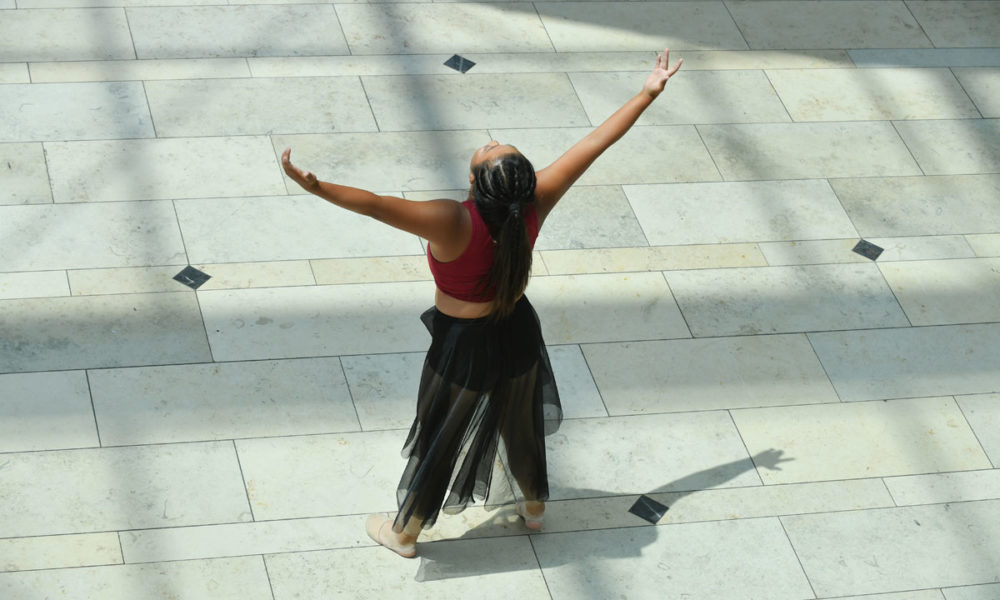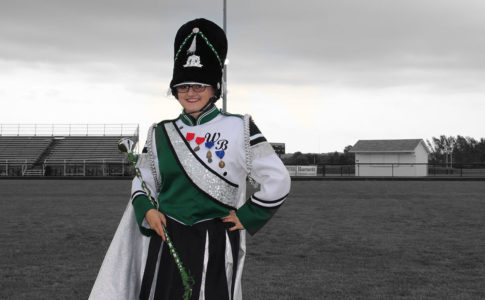Nationwide online movements expand opportunities for marching performers and music educators as they adjust to being bands of one among many.
Jari Villanueva, a retired bugler from the U.S. Air Force Band, was surprised to get a call from Steve Hartman, host of the CBS Evening News “On The Road” series. Hartman knows Villanueva’s reputation as “the Taps Bugler” and called to persuade Villanueva to coordinate a nationwide sounding of “Taps” on Memorial Day. Villanueva was ten steps ahead. “I laughed and said, ‘We’re doing it right now,’” Villanueva says.
Like Villanueva, event organizers have been engaging hundreds of musicians and educators virtually during a summer that’s seen the cancellation of traditional longstanding activities.
Flying Solo but Together
As a result of their call, Hartman and Villanueva teamed up with CBS producers to organize “Taps Across America.” Villanueva invited buglers and trumpet players to sound “Taps” at 3 p.m. on Memorial Day 2020, record a video of the performance, and upload it to a website. “We tested it out; then on Memorial Day, it blew up,” Villanueva says with a laugh. “It didn’t work. They had 800 videos that they were trying to upload at the same time.”
After about a week, every video had been uploaded. Villanueva expected participation from buglers and trumpet players exhibiting a wide range of skill levels. He didn’t anticipate the wide range of instruments represented—like flute, saxophone, French horn, trombone, and bagpipes—that are not usually associated with “Taps.” “Everybody wanted to be a part of this,” Villanueva says. “[We had] every conceivable instrument.”
The pandemic rendered the sounding of “Taps” on Memorial Day as a virtual solo activity. It did the same with Make Music Day festivities. Originally started in France in 1982, Make Music Day is celebrated each June 21 with musicians of all levels gathering to play in parks and other public spaces across the world. “It’s an international celebration of music everywhere and the musician in everyone,” says Jonah Udall, special projects manager of Make Music Alliance.
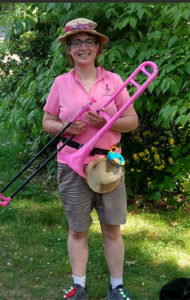 This summer, Udall and other organizers of Make Music Day events faced the challenge of bringing music to the masses without the mass gatherings. “How can we continue to offer opportunities for people to make music live in person in a way that is maximally safe in these times?” asks Udall. “There is something special about live music. One thing we’ve learned during this pandemic … is that live music is not dead.”
This summer, Udall and other organizers of Make Music Day events faced the challenge of bringing music to the masses without the mass gatherings. “How can we continue to offer opportunities for people to make music live in person in a way that is maximally safe in these times?” asks Udall. “There is something special about live music. One thing we’ve learned during this pandemic … is that live music is not dead.”
One solution was to create the World’s Smallest Marching Band, a replacement for one of Make Music Day’s most popular live events, Sousapalooza, an invitation for hundreds of brass, wind, and percussion players to join together and sightread the music of John Philip Sousa. “It’s a pickup concert band,” Udall says.
In the World’s Smallest Marching Band, individual musicians in Brooklyn, New York; Evanston, Illinois; Hartford, Connecticut; Land O’ Lakes, Wisconsin; and West Jordan, Utah, among other cities, paraded and played their instruments by themselves for individuals who listened from their home porches and from the sidewalks outside their workplaces. Make Music Day organizers insisted that the performances be mobile, so people couldn’t gather.
Back in April, the student-run organization YOUnison organized a Worldwide Day of Gratitude that encouraged artists to honor the heroes of the COVID-19 pandemic by posting their own renditions of Bill Wither’s song “Lean on Me.” More than 140 organizations across 31 countries endorsed the activity with submissions ranging from instrumental performances to art projects and dance routines.
Then to celebrate America’s independence, the American Bandmasters Association and “The President’s Own” U.S. Marine Band invited musicians to join in a live virtual play-along as the band’s director, Col. Jason K. Fettig, conducted Sousa’s “The Thunderer” and “The Stars and Stripes Forever.” Separately, students through 12th grade were also urged to submit videos of themselves playing the “The Stars and Stripes Forever.” More than 330 individual student performances were combined with Marine Band footage in a collage video that debuted on July 4.
Creating Homemade Fun
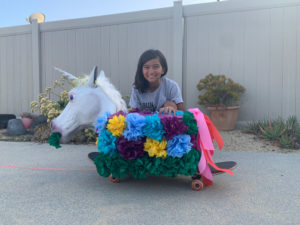 While musicians were marching in one-person parades on June 21, organizers of the Tournament of Roses Parade held a virtual event that showcased homemade floats designed and constructed by kids. The Rosebud Parade “allowed kids and their parents to work on a project together using items from around the house and build little floats to symbolize a theme that was important to that child or to that family,” says David Eads, Tournament of Roses executive director and chief executive officer.
While musicians were marching in one-person parades on June 21, organizers of the Tournament of Roses Parade held a virtual event that showcased homemade floats designed and constructed by kids. The Rosebud Parade “allowed kids and their parents to work on a project together using items from around the house and build little floats to symbolize a theme that was important to that child or to that family,” says David Eads, Tournament of Roses executive director and chief executive officer.
From mid-April to mid-May, participants designed, built, and filmed their homemade floats. Eads says that he expected 40 to 50 submissions. He received 230. One entry, created with cardboard, hot glue, tape, and wooden roses, featured a confetti cannon. Another set of participants took the word “float” quite literally. They constructed a miniature baseball stadium atop Styrofoam and placed it in their backyard pool. The float commemorated a high school baseball season that never took place. “[The virtual parade] was a celebration of the human spirit in a really dark time that we’re all going through,” Eads says. “Some [floats] made you laugh. Some of their stories would make you cry.”
The Tournament of Roses combined the video submissions and aired the compilation on Facebook Live on May 28. The public’s overwhelming positive response to the Rosebud Parade prompted Eads to consider establishing it as an annual event. The Tournament of Roses unfortunately canceled its 2021 Rose Parade.
Competing Online
When the pandemic forced the Drum Corps International (DCI) Performers Showcase into the virtual world, DCI discovered three silver linings arising from the imperfect situation. Because 2020 participants did not need to perform live in front of judges, the event’s reach expanded to individuals of all ages and from all corners of the globe. To accommodate the shift, entries were divided into two categories: under 22 and over 22.
In addition, performing remotely gave participants the opportunity to work on their selections until they were flawless, says Christina Mavroudis, the event organizer. Participants uploaded their performance files to a portal between June 18 and July 24 with judging occurring through the e-Adjudicate platform until Aug. 5. Ensembles could get together and perform “virtually live” as long as restrictions on gatherings in their specific locations had been eased. For ensembles that could not or did not want to get together in person, members could still perform in separate locales and put together a compilation file using any number of webcasting platforms.
As a third advantage for holding the showcase virtually, DCI initiated a multi-track soloist category. Using recording technology, a single student could capture himself or herself playing several instruments or playing the same instrument in a virtual choir. “When we came up with the idea of doing this virtually, we thought there’s got to be a way to let these kids really show off their craft and ingenuity and perfection,” Mavroudis says.
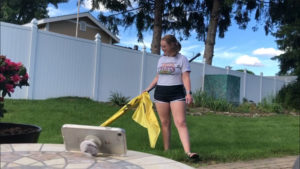 Like DCI, WGI Sport of the Arts moved its individual and ensemble competition online. “When we canceled the remainder of the 2020 season in early March, we hoped that our solo and ensemble events would still be able to happen,” says Julie Noble, special projects and staffing coordinator for WGI.
Like DCI, WGI Sport of the Arts moved its individual and ensemble competition online. “When we canceled the remainder of the 2020 season in early March, we hoped that our solo and ensemble events would still be able to happen,” says Julie Noble, special projects and staffing coordinator for WGI.
She soon realized that was unlikely, but “we knew we wanted a way to let them perform again,” Noble says.
WGI’s eSolo Virtual Competition gave participants the opportunity to win up to $500. Performers uploaded video submissions in more than 20 different classifications in five regions using FloMarching for viewing and adjudication. WGI’s eSolo Virtual Competition was open to all ages and to all performers, including individuals not currently or previously affiliated with a WGI group. Each solo performance received recorded commentary from a WGI judge as well as an overall rating. Winners of the regional events advanced to the WGI eSolo Virtual Finals on Aug. 1.
Like DCI’s Performers Showcase, WGI’s competition featured a new category. “We added a piano category to this event that we didn’t have in 2019,” Noble says. “It was the direct result of performers asking for it. With many of them staying at home right now, that is the instrument they have access to versus a marimba, for example.”
Engaging Educators
Although traditional drum corps shows were canceled for the summer, organizations continued to engage their members and fans by providing educational material. Marching Arts Education worked with DCI to present the DCI Summer of Learning, a set of live webinars and interactive events that gave marching arts professionals and their students access to top designers and instructors. Each Monday through Thursday in June and July, a different corps presented up to four interactive sessions per day. Fridays focused on techniques for front ensemble. “We were missing the live performances, but these corps were [offering] education online,” says Tim Hinton, creator of the Marching Arts Education website.
The corps were happy to offer tips and expertise but also used the opportunity to stay on everyone’s radar, Hinton says. “We want these corps to be around for 2021, but a lot of them are struggling,” he says. “So the idea was not only for them to give back to the marching arts community, but it [also] gave us a chance to support them. [In the webinars], they tell us how to make a donation, how to buy a T-shirt, how we can audition for their corps next year. It keeps us engaged with the activity. That was our goal.”
When Music for All canceled its 2020 Summer Symposium, the organization expanded the education portion of its website to include asynchronous videos and e-courses available for both directors and students. “These are designed and produced by our faculty for free,” says James Stephens, director of advocacy and educational resources for Music for All. “Directors can sample messages and design a curriculum for their kids. We’re excited to be able to offer that through our educational resource site at education.musicforall.org.”
In addition to the leadership videos, Music for All introduced several webinar series this summer. “Mind the Gap” addresses student teachers impacted by the pandemic. “With a Little Help From My Friends” features unscripted conversations with master teachers.
Conn-Selmer, which hosts an annual summer professional development conference, rebranded the event as Conn-Selmer Institute Connect and held it virtually. Moving the conference to the Internet allowed more music directors to attend; 2,100 individuals participated in the virtual two-day conference compared to about 400 people at its usual physical location. “Everybody was able to jump on board,” says Dr. Tim Lautzenheiser, vice president of education at Conn-Selmer. “There were people from around the world who normally couldn’t afford to make the trip.”
Its virtual nature also allowed individuals to attend more sessions than they normally could. Because the sessions were recorded, attendees could watch all of them. “When you go to a conference, you can only get six sessions a day,” Lautzenheiser says.
Though the future of live events is still uncertain, many benefits have been experienced by developing and participating in virtual activities. “Although not done in person, projects or initiatives like the Rosebud Parade create a community,” Eads says. “We all want to be part of a community, and that’s really difficult right now. These types of projects allow people to work together to identify with something a little bigger than themselves and bring hope and joy.”

